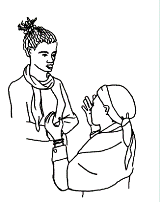When we are teaching, training and facilitating on any topic it can be tempting to give all the answers. But when we do not give answers, we give those we are working with something even more important: an opportunity to discover what they know already and to grow in confidence. In this way we help people to mobilise their own resources.
Here is an example of a conversation about pricing a new product. The facilitator refuses to give the answers but asks useful questions.
Facilitator: How much are you going to sell it for?
Learner: I don’t know.
Facilitator: So, what do you think you need to know to help you decide what the price of your product should be?
Learner: First, I need to know the cost, but I don’t know how to calculate the cost.
Facilitator: What do you need to help you do it?
Learner: I need training about calculating a cost.
The facilitator reminds the learner of what she already knows
Facilitator: I think you know how much you spend in a month on living costs.
Learner: Yes, I do know. I spend about 600 birr.
Facilitator: How do you calculate your monthly costs?
Learner: I list out the items that I need for a month and I check the price for each item from the nearby shop. I know what I spend on house rent and so on.
Facilitator: You’ve told me that you know your living cost. So why do you say ‘I need training to calculate the cost of my product’?
Learner: This is what I know people are saying. If you want to learn about something, you need training.
Facilitator: Did you get training to calculate your living cost?
Learner: No, I did not.
Facilitator: So, can you tell me the items you need to buy for your product and the price for each item?
Learner: I know what I need. But I don’t know the price for some of the items.
The facilitator encourages the learner to solve her own problem
Facilitator: Okay. Where do you think you find out those prices?
Learner: I can go to the market and check what the items are sold for.
Facilitator: How long will it take you to get the price information and to finish your product?
Learner: I need half a day to check the selling price, and three days to finish the product.
The facilitator builds the learner’s confidence by asking what she has learned
Facilitator: So, what have you learned about yourself from this conversation?
Learner: I think I can learn if I know what I need. How? I can find out what I need for a product and estimate the cost of each item.
Facilitator: What else have you learned about yourself?
Learner: I used to think that I could learn about costing only if I attended training. Now I think I can teach myself.
There are three aspects to a conversation that has learning as its goal:
- Relevance to life – unless a learning topic is relevant to learners’ lives it is unlikely that they will invest the energy to learn and change.
- Tutorial – this focuses on what learners wants to learn about and where they hope to improve their performance.
- Learning to learn – the conversation may question current ways of learning and consider the need to learn things differently.
Material taken from Releasing potential: A facilitator’s learning resource for self-help groups by Isabel Carter. Look at the Resources page for more information.
Questions to consider
- Can you identify the three different aspects to the conversation above?
- How do you think the conversation could be improved?
- How could you use this approach with children?







